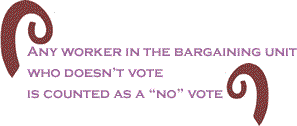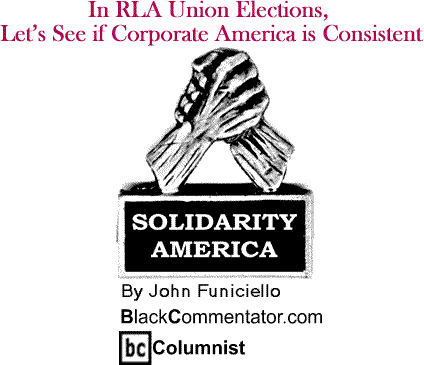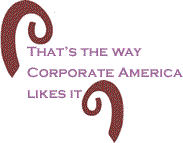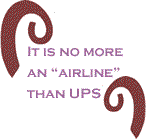
|
||||||||||||||||||||||
|
||||
 |
||||
There they go again. The country´┐Żs commercial interests - and the right-wing, if they aren´┐Żt the same - are getting themselves worked up over a proposed change in one of the country´┐Żs major labor laws and they don´┐Żt want to see it happen. We have two sets of such laws in the country, the National Labor Relations Act (NLRA) and the Railway Labor Act (RLA). The latter primarily covers those in the transportation industries, such as railroads and airlines, while the NLRA covers most others in the private sector. In
That pretty much holds true for most American elections - except for the RLA, which, for the past 75 years, has run its elections for union representation in such a way that any worker in the bargaining unit who doesn´┐Żt vote is counted as a ´┐Żno´┐Ż vote. So, if 45 percent of the ´┐Żelectorate´┐Ż in a railroad union election chooses not to cast ballots and the remainder vote overwhelmingly for the union, but fall short of a winning that elusive 50 percent plus one, the workers don´┐Żt get their union. And that´┐Żs the way the railroad companies and the airlines like it. And that´┐Żs the way Corporate America likes it - anything to hamper union organizing and holding American workers in a kind of representational limbo, as far as their economic security goes. Early this month, two of three members of the National Mediation Board, which sets the rules for RLA elections, proposed a change that would provide a one-worker-one-vote for union elections and would eliminate the un-American aspect of counting the non-voters as ´┐Żno´┐Ż votes. The chair of the MNB, a leftover appointment from the Bush Administration, has protested the move, saying that, usually, such changes were done by consensus among the three members. If
the current rule were in effect throughout the entire
The
RTWC describes itself as ´┐Ż The committee and its legal foundation usually can find a few workers who are willing to be used to further the ends of the RTWC, but it is by no means a workers´┐Ż membership organization, as one might believe from their public relations. But the RTWC is not alone, there are all of the other groups that claim to be ´┐Żfor´┐Ż American working women and men, while all the time fighting against the only institution, the labor movement, that exists to better the lives of tens of millions of workers in the U.S. Remember
the Employee Free Choice Act (EFCA)? These same business interests,
like the U.S. Chamber of Commerce, and a number of other similar
groups and the right-wing think tanks that do their bidding, howled
in opposition to the section in EFCA that would have allowed workers
in a particular workplace to form a union if 50 percent plus one
of those workers signed union cards. That was a majority rule situation, but Corporate America whined that it would deprive the workers of an election, which is a sacred tradition in the nation. A secret ballot election is what they wanted for all workers. Except, that is, for those under the unusual RLA rules. They could just get by with an election in which all those who stayed home would be counted as ´┐Żno´┐Ż votes. Strange that business interests are not complaining about the way elections are run under the RLA, which is against the ´┐Żsacred tradition´┐Ż of elections being won by a majority-plus-one of the people who actually vote. Their reasoning for fighting for the status quo is simple. In this case, the most immediate case is that of FedEx and UPS. For whatever reason that was cooked up at the time Federal Express was formed, it was put under the RLA, as opposed to the NLRB, which would have made it easier for unions to organize. UPS is under the jurisdiction of the NLRA and it is a union company, most of its workers being Teamsters. When FedEx workers tried to organize in 1996, the company lobbied with all of its money and muscle to force Congress to keep the company under the RLA, thus making it much more difficult for workers to organize. FedEx was successful and now, if its workers want to organize a union, they have to mount a campaign from coast to coast, among the 80,000 workers in facilities in every part of the country. Congress was able to justify its move to allow the RLA to retain jurisdiction over FedEx because it is an ´┐Żairline.´┐Ż However, it appears that it is no more an ´┐Żairline´┐Ż than UPS, which also has its fleet of cargo planes and organized pilots and flight crews, yet it has always been under the jurisdiction of the NLRA, since the law was passed.
These are the same people who removed jobs by the tens of millions and whole industries to low-wage countries, all in pursuit of profits and all without regard for the devastating effects on the American people and their economy. Whatever their rhetoric and public relations, they are not friends of wage-working Americans. BlackCommentator.com Columnist, John Funiciello, is a labor organizer
and former union organizer. His union work started when he became
a local president of The Newspaper Guild in the early 1970s. He
was a reporter for 14 years for newspapers in |
||||
 |
||||
If you would like to comment on this article, please do so below. There is a 400 character limit. You do not need a FaceBook account. Your comment will be posted here on BC instantly. Thanks. Entering your email address is not mandatory. You may also choose to enter only your first name and your location.
|
||||
Thank you very much for your readership. |
||||
| Any BlackCommentator.com article may be re-printed so long as it is re-printed in its entirety and full credit given to the author and www.BlackCommentator.com. If the re-print is on the Internet we additionally request a link back to the original piece on our Website. | ||||
| |
||||
| November
19 , 2009 Issue 351 |
| Executive Editor: Bill Fletcher, Jr. |
| Managing Editor: Nancy Littlefield |
| Publisher: Peter Gamble |
| Est. April 5, 2002 |
| Printer Friendly Version in resizeable plain text format |
 |

|
 |
| |
| |

































 The
howls of ´┐Żunfair´┐Ż have come from business groups and one of the
nation´┐Żs premier ´┐ŻAstroturf´┐Ż groups (fake grass roots organizations),
The Right to Work Committee (known among union workers as the
Right-To-Work-For-Less-Committee), which described the proposed
change in this way:
The
howls of ´┐Żunfair´┐Ż have come from business groups and one of the
nation´┐Żs premier ´┐ŻAstroturf´┐Ż groups (fake grass roots organizations),
The Right to Work Committee (known among union workers as the
Right-To-Work-For-Less-Committee), which described the proposed
change in this way: That
section was called ´┐Żcard check´┐Ż and the howling was enough to
get it removed from the legislation.
That
section was called ´┐Żcard check´┐Ż and the howling was enough to
get it removed from the legislation.











